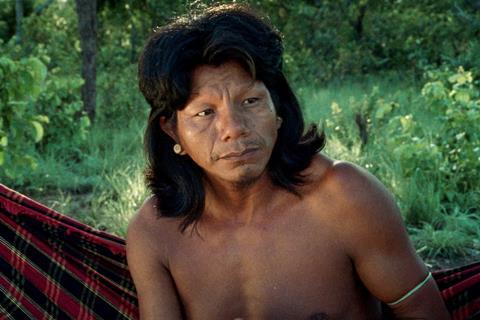Docu-drama explores the relationship between the past and present for Brazil’s indigenous Krahô community

Dirs: Joao Salaviza, Renee Nader Messora. Brazil, Portugal 2023. 125mins
Stories keep the past alive in The Buriti Flower, the latest film from directors Joao Salaviza and Renee Nader Messora which continues their collaboration with the indigenous Krahô community of Brazil. Blending elements of documentary and drama, it immerses us in the lives of a people constantly facing threats to their existence. Growing more involving as it unfolds, it builds an emotional connection that should translate into arthouse potential following its Cannes world premiere.
Immerses us in the lives of a people constantly facing threats to their existence
Salaviza and Messora previously won the Un Certain Regard special jury prize for The Dead And The Others (2018). The Buriti Flower attempts a more ambitious scope, focusing on the lives of the Krahô and how the current struggles to protect the integrity of their sacred lands are part of a much larger story.
Shot for fifteen months in four different villages within the Krahôlandia Indigenous Land, the film has members of the Krahô community collaborating on the script and playing themselves. The story is structured around Ilda Patpro Krahô’s decision to attend a conference in Brasilia designed to focus attention on the needs of indigenous communities throughout Brazil. The Krahô lands are under threat from commercial exploitation, farming and the legacy of Bolsonaro, leaving Patpro Krahô convinced of the need to stand up and have their voices heard. Others fear that this is one more futile gesture. The build-up to the Brasilia conference allows the filmmakers to provide layers of context through collective memories , the stories that have shaped the Krahô’s understanding of their own history and through dramatisations of key moments from the past.
Patpro Krahô’s daughter Jotat is having trouble sleeping. Her uncle, Francisco Hyjno Krahô, is convinced that her restless soul is at liberty and visiting the past. We witness a recreation of a massacre that took place in 1940 and the impact of the military dictatorship in the 1960s. There is black and white footage of Patpro’s grandmother, Crowra. All contribute to the growing understanding of how everything in the present is tethered to what has happened in the past. The Krahô are constantly considered collateral damage in the pursuit of capitalist gain or colonialist domination. The 21st century threat lies in illegal mining, contaminated water, logging and those willing to violate their designated lands to kill and steal wildlife. There is a lucrative trade in stolen macaws.
Salaviza and Messora’s approach reveals a deep-rooted respect for the Krahô. The massacre is shown through the eyes of a hiding child and never in gruesome close-up. There is also an understanding of the dilemma in which the Krahô find themselves. There is a longing for a simpler time when the land provided food, rivers delivered water and fish and people lived in harmony. At the same time, it is difficult to honour ancient traditions and rituals in an age full of modern conveniences from telephones to air conditioning. “ No one is naked at the feast any more, “ laments one villager. “ Everyone wants to wear underpants and shorts. It’s just not the same.”
Laced throughout with songs of protest by Zelda Barbosa on the soundtrack, the film allows the viewer to spend time walking in the footsteps of the Krahô, witnessing the beauty of their land and the strength of their resolve. A giant bursiti flower dominates the landscape, constant and steady in the face of endless changes. This is a film of context and empathy, which underlines the importance of indigenous communities in managing the land, a factor ever more acute as climate change takes hold.
By the time Patpro Krahô attends the Brasilia conference, you are aware how much it means for her and the Krahô and what might lie ahead. Her hope that an indigenous woman might one day be President of Brazil is juxtaposed with scenes of Hyjno’s wife Crowra (the same name as his grandmother) giving birth. Acknowledging the past but placing faith in the future lends an emotionally-charged climax to a sensitive, eye-opening film.
Production companies: EntreFilmes, Karo Filmes, Material Bruto
International sales: Films Boutique, contact@filmsboutique.com
Producers: Joao Salaviza, Renee Nader Messora, Ricardo Alves Jr, Julia Alves
Screenplay: Joao Salaviza, Renee Nader Messora, Ilda Patpro Krahô, Francisco Hyjno Krahô, Henrique Ihjac Krahô
Cinematography: Renee Nader Messora
Editing: Edgar Feldman, Joao Salaviza, Renee Nader Messora
Main cast: Ilda Patpro Krahô, Francisco Hyjno Krahô, Solane Tehtikwyj Krahô
























